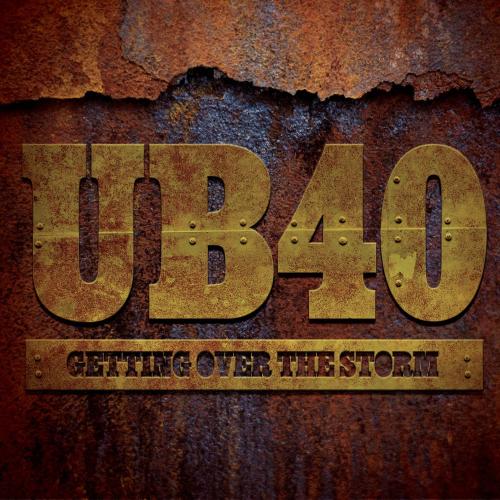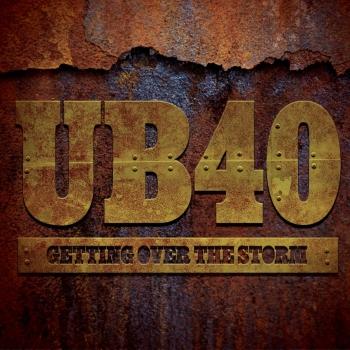
Getting Over The Storm UB40
Album info
Album-Release:
2013
HRA-Release:
19.08.2013
Album including Album cover
I`m sorry!
Dear HIGHRESAUDIO Visitor,
due to territorial constraints and also different releases dates in each country you currently can`t purchase this album. We are updating our release dates twice a week. So, please feel free to check from time-to-time, if the album is available for your country.
We suggest, that you bookmark the album and use our Short List function.
Thank you for your understanding and patience.
Yours sincerely, HIGHRESAUDIO
- 1 Midnight Rider 04:09
- 2 Just What’s Killing Me 04:38
- 3 Getting Over The Storm 03:27
- 4 Blue Bilet Doux 03:27
- 5 If You Ever Have Forever 04:25
- 6 Crying Time 03:15
- 7 How Will I Get Through This 04:11
- 8 He’ll Have To Go 04:18
- 9 Blue Eyes Crying In The Rain 03:26
- 10 I Did What I Did 03:14
- 11 On The Other Hand 03:51
- 12 How Can A Poor Man Stand Such Times And Live 04:44
- 13 I Didn’t Know 04:45
Info for Getting Over The Storm
Nachdem zuletzt im Jahr 2010 das Album „Labour of Love IV“ erschienen war, präsentieren UB40 auch auf „Getting Over The Storm“ eine Kombination aus brandneuen Tracks – fünf Stück an der Zahl – und Coverversionen von diversen Klassikern, denen sie ihren klanglichen Stempel aufdrücken. Neu und einzigartig daran ist allerdings, dass sie die Songs für ihre Neuinterpretationen dieses Mal durchweg von Musikern oder Songwritern entliehen haben, die allesamt aus der Country-Ecke stammen.
Brian Travers, seines Zeichens Saxofonist der Band, weiß ganz genau, wie gut Country-Musik (nicht nur) bei ihren Fans in der Karibik ankommt: „Wir alle haben viel Zeit in Jamaika verbracht, und Country-Musik ist dort einfach ein zentraler Teil der Kultur. Es ist halt ein ganz ehrlicher Sound, genau wie Reggae. Schon aus dem Grund passen die beiden Genres perfekt zusammen.“
MC Astro sieht die Sache genauso: „Ich wage zu behaupten, dass es in der Karibik kaum einen Haushalt gibt, in dem man kein Album von Jim Reeves finden kann. Also bei mir daheim zumindest gab’s einige davon, und bei all meinen Freunden aus der Region, mit denen ich aufgewachsen bin, sah’s genauso aus. Wenn man einen seiner Freunde besuchte, schaute einen als erstes immer Jim Reeves an: Das Cover mit seinem Antlitz vorne drauf stand meistens oben auf einem dieser großen Blue-Spot-Plattenspieler. Es gibt da diese ganz besondere Verbindung zwischen Country und Jamaika.“
Der Grundstein für die nun erscheinenden Country-Coverversionen wurde bereits im Jahr 1990 gelegt, als UB40 den Song „I’ll Be Your Baby Tonight“ mit dem befreundeten (und inzwischen verstorbenen) Robert Palmer aufnahmen. Robin Campbells Kommentar zu jener Single, die in UK auf Platz #6 landete: „Robert wollte damals unbedingt den Song ‘On The Other Hand’ von Randy Travis aufnehmen, was wir dann auch taten. Das Problem war hinterher nur, dass uns nach seinem Tod die Rechte an Roberts Gesangspart versagt blieben – weshalb auf dem neuen Album nun Duncan (Campbell) diesen Part neu eingesungen hat. Und da wir die Idee, noch weitere Country-Songs zu covern, einfach zu verlockend fanden, gingen wir schließlich all unsere Lieblingsalben aus der Ecke durch und einigten uns schon bald auf Songs wie ‘Getting Over The Storm’ von George Jones, ‘He’ll Have To Go’ von Jim Reeves, Willie Nelsons ‘Blues Eyes Crying In The Rain’ oder auch ‘If You Ever Have Forever In Mind’ von Vince Gill.“
„Allerdings ist es kein Country-Album“, unterstreicht Robin nachdrücklich. „Es ist ein UB40-Album. Ein Reggae-Album. Für das wir ausnahmsweise Coverversionen von Country-Songs angefertigt haben.“
Wie bei sämtlichen Albumveröffentlichungen seit „Who You Fighting For“ aus dem Jahr 2005, wurde auch der kommende Longplayer komplett live im Studio eingespielt. „Die ganze Studiotechnik spielt schon länger keine so große Rolle mehr für uns“, berichtet Robin Campbell. „Das Ganze ähnelt eher einer Session im Proberaum: Wir sitzen im Kreis und spielen zusammen die Songs ein. Nur so kann der richtige Vibe entstehen.“ Was zusätzliche Overdubs anbelangt, setzte die Band auf die Steelguitar-Ikone Melvin Duffy, dessen Country-Background natürlich nicht schaden konnte: „Ja, Melvin hatte da vollkommen freie Hand, und die Resultate sind wirklich perfekt. Kaum ein Musiker geht so intuitiv an die Sache heran wie er.“
Seit der Bandgründung im Jahr 1978 sind UB40 immer wieder mit politischen Texten aufgefallen, doch auf „Getting Over The Storm“ geht es ihnen in erster Linie um etwas anderes: Herzensangelegenheiten, Gefühlsfragen, Persönliches. Der Song mit dem deutlichsten politischen Einschlag ist somit wohl ihre Version von „How Can a Poor Man Stand Such Times And Live?“, der während der Weltwirtschaftskrise im Jahr 1929 von Blind Alfred Reed geschrieben wurde (und erst 1970 in der Version von Ry Cooder richtig bekannt werden sollte). „Die Texte haben wir zum Teil etwas überarbeitet, um sie ins Hier und Jetzt zu transportieren“, erläutert Robin, „doch es stimmt: Das ist der einzige politische Track auf dem Album. Alle anderen handeln eher davon, wie ein Mensch einen anderen verletzt. Alles gebrochene Herzen.“
Duncan Campbell, erst seit 2008 Lead-Sänger von UB40, nachdem sein Bruder Ali aus der Band ausgeschieden war, läuft auf seinem zweiten Album in dieser Rolle zu Höchstform auf: „Duncan war ja schon immer ein Sänger“, kommentiert Brian, „und es ist unglaublich, wie schnell er in diese Rolle als Sänger für uns reingefunden hat. Seine Stimme und sein ganzer Style sind perfekt für die Songs auf dem neuen Album.“
Mit über 40 Top-40-Hits allein in UK und über 80 Millionen verkauften Alben zählen UB40 längst zu den erfolgreichsten Reggae-Bands der Musikgeschichte.
Robin Campbell, guitar, vocals
Earl Falconer, bass
James Brown, drums
Norman Hassan, percussion, trombone, vocals
Tony Mullings, keyboards
Duncan Campbell, lead vocals
Brian Travers, saxophone
Astro, trumpet, vocals
UB40
The story of UB40, and how this group of young friends from Birmingham transcended their working-class origins to become the world’s most successful reggae band is not the stuff of fairytales as might be imagined. The group’s led a charmed life in many respects it’s true, but it’s been a long haul since the days they’d meet up in the bars and clubs around Moseley, and some of them had to scrape by on less than £8 a week unemployment benefit. The choice was simple if you’d left school early. You could either work in one of the local factories, like Robin Campbell did, or scuffle along aimlessly whilst waiting for something else to happen.
By the summer of 1978, something else did happen, and the nucleus of UB40 began rehearsing in a local basement. Robin’s younger brother Ali, Earl Falconer, Brian Travers and James Brown all knew each other from Moseley School of Art, whilst Norman Hassan had been a friend of Ali’s since school. Initially, they thought of themselves as a "jazz-dub-reggae" band, but by the time Robin was persuaded to join and they’d recruited Michael Virtue and Astro – who’d learnt his craft with Birmingham sound-system Duke Alloy – the group had already aligned themselves to left-wing political ideals and forged their own identity, separate from the many punk and Two Tone outfits around at that time. The group had nailed their colours to the mast by naming themselves after an unemployment benefit form. Their political convictions hadn’t been gleaned second hand either, but cemented in place whilst attending marches protesting against the National Front, or rallies organised by Rock Against Racism.
By the time Chrissie Hynde invited them to tour with the Pretenders during the summer of 1980 and their debut single "King b/w Food For Thought" had sailed into the UK Top 5, all the essential elements of UB40 were already in place. Their line-up will remain unchanged for almost thirty years, and they will continue playing a mix of original material and inspired choice of reggae covers in a style that’s instantly accessible with its bright melodies and sweeping horn arrangements – one that’s allied to a formidable rhythm section, capable of holding its own with anything from Jamaica.
UB40’s first album was released the following September, on Graduate Records. Their deal allowed them more creative freedom than if they had signed with a major label. The cover artwork memorably duplicated an unemployment benefit card, with the title "Signing Off" rubber-stamped in red, but it was the music that quickly worked its way into the affections of a young, mainly student crowd with its knowing lyrics, solid reggae rhythms and dubby, instrumental passages, offset by warm horn solos and Jamaican style scatting. There was nothing else like it at the time. As a multi-cultural band from Birmingham, UB40 weren’t drawn into trying to sound "authentic," and there was considerably more depth to their music than that of many punk and 2Tone bands. "I’m a British subject, not proud of it, whilst I carry the burden of shame," they sang on one of the tracks. Accepting the truth of their own situation amidst a sea of other reggae songs proclaiming black heritage gave us a valuable insight into where UB40 were coming from. They were unafraid to stand up and be counted, and British audiences instinctively loved them for it. "Signing Off" duly went to No. 2 in the UK and stayed on the nation’s album charts for 72 weeks.
At the end of 1980, the contract with Graduate expired and UB40 formed their own record company, DEP International, with all eight members owning an equal share. They also signed a licensing deal with CBS, which ensured them far better distribution. "Signing Off" was still in the charts when they released their second album "Present Arms" in the summer of 1981. The sound was immediately brighter, harder and more professional, yet the spirit and commitment underpinning the band’s songs remained resolutely unchanged, as heard on "One In Ten," written about the UK’s record number of unemployed. With lyrics like "Nobody knows me, but I’m always there. A statistical reminder of a world that doesn’t care," "One In Ten" became an anthem of the British protest movement, and a genuine counterpart to the equally motivated songs being written by the likes of Bob Marley and Peter Tosh in the Caribbean. "One In Ten" will earn the rare distinction of being "versioned" by Jamaican reggae acts in future. Back in 1981, it formed part of the soundtrack accompanying the race riots erupting in places like Brixton, Handsworth and St. Paul’s in Bristol – hard pressed, inner city areas with large immigrant communities that had found themselves on the frontline in resisting the right wing policies of Margaret Thatcher’s government. More information, please visit: www.ub40.co.uk
This album contains no booklet.








